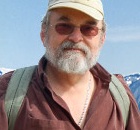I recently spent a weekend at a Geography of Hope conference focused on the thinking of Aldo Leopold, perhaps America’s most important environmental thinker. He is rivaled today only by Henry David Thoreau and John Muir. I personally consider Leopold’s A Sand County Almanac a classic because, for me, the test of a classic is how the author seemingly gets smarter and more insightful each time we read him. Such has been my oft-repeated experience with Leopold.
There is likely no major dimension of American conservation and environmental thought that Leopold has not influenced. He played an important role in enabling farmers to return land that was devastated during the dust bowl to agricultural health. He demonstrated how worn-out farm land could also be restored to ecological health for wild beings, plants and animals alike. He pioneered the science of wildlife management. He wrote the single most influential book making the case not just for conservation, but for a genuine land ethic, and in the process expanded our awareness of the communities within which we should consider ourselves just “plain citizens.” And he was the originator of the idea of wilderness areas in the United States. America’s first protected wilderness is named after him, the Aldo Leopold Wilderness in New Mexico.
This last achievement, which I believe is one of his most important, was little discussed during the conference. As a concept, wilderness seems to have fallen from favor among the academics who dominated its panels and set the tone for its discussions. Some simply acted as if the time was past for such a culturally relative concept: It was once useful, but more important and relevant issues confront us now. Others were even more critical, and it is a comment by one such critic that inspired discussion of how we can best think about wilderness.
One participant announced that wilderness was a “colonialist” concept. The first settlers in New England had proclaimed the land a “howling wilderness,” never really considering that many people called it home and had done so for millennia. Therefore, wilderness was a Western concept about which we should feel, at best, ambivalent. It was used to justify denying people access to land that in fact had never been without considerable human impact ever since the first people arrived.
I want to dismantle that point of view here. My being a Pagan is partly why I think overly intellectualized academics can never adequately understand wilderness or anything like it.
Wilderness as a place set aside free of human exploitation is an American concept. And it has roots, I suppose, in colonialism, although the colonialists simply transferred a Biblical term into an American context. So its roots are actually far deeper than that.
But its meaning has changed decisively. It began to do so when people began journeying into wild country not to subdue it, but to experience it. Thoreau did so to some considerable degree when he climbed Maine’s Mt. Katahdin. But in some ways, Thoreau was discomfited by his encounter with the truly wild, writing in The Maine Woods,
It was vast, Titanic, and such as man never inhabits. Some part of the beholder, even some vital part, seems to escape through the loose grating of his ribs as he ascends. He is more lone than you can imagine. There is less of substantial thought and fair understanding in him, than in the plains where men inhabit. His reason is dispersed and shadowy, more thin and subtile, like the air. Vast, Titanic, inhuman Nature has got him at disadvantage, caught him alone, and pilfers him of some of his divine faculty. She does not smile on him as in the plains. She seems to say sternly, why came ye here before your time? (p. 64)
Walden Pond, near Boston, was in a long-settled region, what we call “country” rather than wild land. Katahdin was wild, fiercely so. At Walden the plants and animals of the area played well together not only with one another, but with its dominant human inhabitants. There were no grizzlies, cougars, or wolves.
John Muir traveled far more extensively than Thoreau into truly wild country, and like him, did so to experience it directly on its own terms. Like Thoreau, his descriptions are powerful and unforgettable, but he is more at ease with the fact that the land existed free from any human concerns. As he wrote of the Sierra Nevada, “Climb the mountains and get their good tidings. Nature’s peace will flow into you as sunshine flows into trees. The winds will blow their own freshness into you, and the storms their energy, while cares will drop away from you like the leaves of Autumn.”
Muir’s writings about California’s mountains as well as other even wilder places taught Americans how to see wild land in a new way. Many were attentive students, and so Muir helped inaugurate what we now call the environmental movement.
A new experience
Americans and Canadians encountered nature in a way few had experienced for millennia. Historically the world had long been inhabited anywhere humans could reach and survive. Except for Antarctica, just about every place was home to somebody.
The ‘New World’ was different, and in a sense it was genuinely new. With the coming of Europeans, plagues had been unleashed that devastated populations on a scale perhaps never before encountered. Small pox, measles, influenza, and other diseases, most not lethal to Europeans, destroyed entire peoples and left the survivors dazed and devastated. Many Indians had been agricultural, and their fields were abandoned. Forests had been extensively modified by fire clearing out underbrush, making travel and hunting easy. The caretakers were now gone. Early Europeans often described the country as like a giant park, and like parks, it had been modified to serve human well-being. But they did not know that. Knowing nothing of these peoples and caring less, and usually regarding survivors and their descendents as primitive nuisances or worse, most Europeans considered the land they encountered a “wilderness,” its features untouched rather than differently touched.
We will likely never know how much of the abundance of animal life our ancestors encountered was simply the result of the decimation of the land’s previous human populations. It must have made a difference. On the other hand, the enormous herds of buffalo, elk, and antelope on the plains were almost certainly the norm, for other than river valleys the plains had been only very lightly inhabited. It took the coming of the horse to open them up. Certainly no animals had gone extinct since the disappearance of the Pleistocene megafauna at the end of the Ice Age, yet the tribes had the means and, had they been Europeans, the motive to wipe some species out of most or all of their range.
What we do know is that Euro-Americans encountered lands vacated by most of the inhabitants who had been there for thousands of years. A few Americans ventured into these lands not to appropriate them or treat them simply as a storehouse of resources to become wealthy, but rather to encounter them for their own sake and on their own terms. They brought a different mind set, and as we should know by now, mind set has an enormous influence on what we perceive.
Learning to see
Let me give two analogies for what I am trying to describe, both taken from our human world. Having sex with someone during a one-night stand is qualitatively different from having sex with a beloved partner, even if there are also many similarities. Most if not all of the differences are not physical, but mental. They are differences in perception, feeling, and valuing. I am not critical of either, but upon being asked, most of us would say the second is normally a deeper, more fulfilling experience.
A second example involves friends. We know friends can be very useful. But friends are not like hired hands or personal assistants whom we employ and pay in return for services rendered. What makes them our friends is our pleasure in their existence as the beings they are. That they can also prove immensely useful on occasion is not why we value them. In fact, if the reason we say we are someone’s friend is because we find them useful, we are not really their friend.
Again, I am not criticizing the more pragmatic relationships of employees, employers, personal assistants, consultants, and all the other myriad mostly instrumental relationships we have in the modern world. But we find relations with friends more fulfilling than our relations with those who interact with us because we pay them or they pay us. Upon one’s death bed, it seems a universal observation that the presence of loved ones and friends is vastly more important than just about anything else.
Houses, homes, and temples
From these examples I want to suggest we can relate to the land in at least three ways: purely instrumentally; as a place we can turn into a home; or in some sense, on its own terms. We need at least three basic concepts to begin talking clearly about our relationship to the earth. I want to label these concepts as house, home, and temple.
A house is something we buy perhaps to hold a while and then sell. We hope to make a profit. Its value to us is in the return we expect to get from selling it. We certainly do not need to live in the houses we buy. In short, in itself a house has no intrinsic value to us. Its value is the money it can be turned into.
A home is where we live. If a house might be a “crash pad,” a home is where we dwell. We invest ourselves in it, and not just our cash. A home reflects who we are. We like or love the money we make from selling a house, but we love a home for what it is, not what it can bring in. Often, we may often be uninterested in selling it at all.
A temple is a place we do not treat as either a house or a home. It is a place where we seek to encounter, honor, or preserve that which is in some sense more than ourselves. Temples are places of the more-than-human.
Land can be understood in this way, just as a building can.
Many of us feel at home in a particular place and might pay a significant price to live there, either financially or by forgoing other comforts and advantages because we love that place. Other people will live wherever they can make the most income or best advance their careers, or for some other reason not connected to the place, which they will easily leave once a better opportunity arrives. Wallace Stegner and Wendell Berry called these types “stickers” and “boomers.” I am not as harsh on the boomers as they are, but the distinction is a genuine one, and important.
I might also be drawn to make a home in a place where the land around me is as a temple to me. I am thinking, for example, of those who seek to preserve the views and land unencumbered by new developments because they recognize something intrinsically valuable in that place being left alone. We can easily appreciate their motives, even if we sometimes quip that their attitude is, “Now that I have mine, stay out.”
Wilderness is the term by which many modern Westerners can safely approach and even honor the sacred in the earth without having their conventional views of the world undermined. The term refers simply to a large chunk of land where people do not live. But of course this description says nothing at all about why people want such ‘chunks’ kept free of habitation.
Close encounters of the third kind
Wilderness and wild country where no one lives must be directly experienced to be understood as a temple. Academic studies and even beautiful photographs do not do the job–although photos come a lot closer than the printed word, unless perhaps those words are poetry. To grasp what wilderness is and why it is important for more than utilitarian reasons is like understanding why friendship and love are important for more than utilitarian reasons. All three must be directly experienced. And in each case, afterward, the world is never the same.
Native Americans regarded their places as homes. But they were not just homes. There was also a larger context, one most directly grasped by shamans, medicine people, and sometimes others. These people experienced a more-than-human context within which men and women, and their homes, all found deeper meaning.
For the modern Western mindset, wilderness is how we relate to land as temple. It is a safe concept for modern humanist and Christian alike, a way they can open themselves up to the more-than-human in the earth. Beauty surrounds them, beauty freed from utilitarian considerations and often accompanied by considerable personal discomfort. Peace normally pervades such places, and we are freed by them from our concern with our daily troubles. The power of a wild storm can do the same, but differently. Philosophically we safely place “beauty,” “peace,” and the exhilaration of storms in the category of the ‘merely’ subjective, but experiencing these qualities changes lives in ways that discovering the joy of eating chocolate ice cream does not.
The term “wilderness,” and the philosophical language surrounding it, is culturally shaped, but the insight underlying it is universal, or rather so nearly universal that what needs explaining is the fact that some cannot grasp it.
For the person who experiences the world as sacred and meaningful, the boundary between wilderness and home becomes porous because the sacred is everywhere. For Native Americans, there were often places that were not home, that were used for vision quests and the timeless practices of shamanism. Being away from home was an important part of the experience, but the division was a gradient.
Our wilderness areas have sharp boundaries because our society sees land in terms of economics, as houses, as it were, rather than even homes. Wilderness needs to be divided from our society as a whole because our society is blind to important elements of the world. Wilderness Areas are both magnificent achievements and sad commentaries on our world. A spiritually wiser society would have a gradient.
Wilderness in its current meaning, then, is not a relic of the colonial imagination: it is akin to an act of spiritual judo. A word with almost entirely negative connotations has become a word with very different positive ones. It enables us to honor a dimension of reality our dominant ways of understanding simply cannot account for–and let us remember, English had no other word able to do the job. Wilderness preserves a realm of sanity and sight in a society that for the most part is both insane and blind with respect to the more-than-human world.















